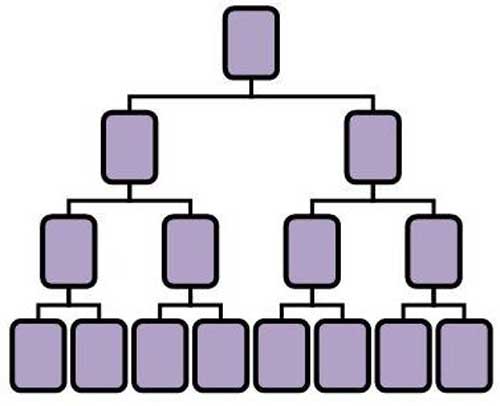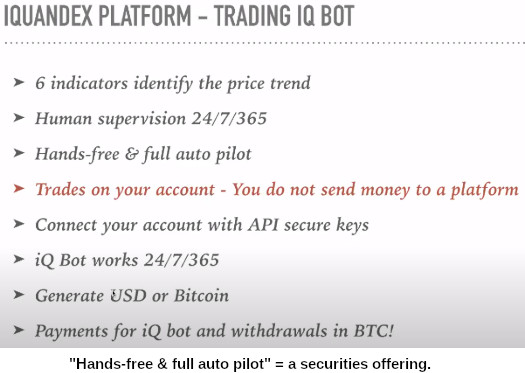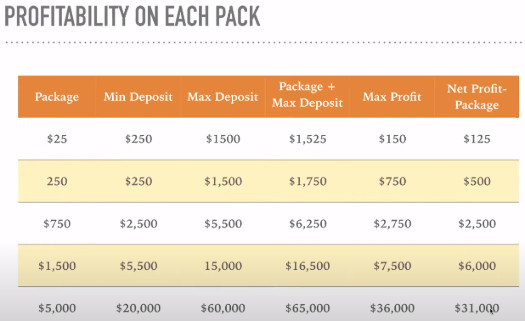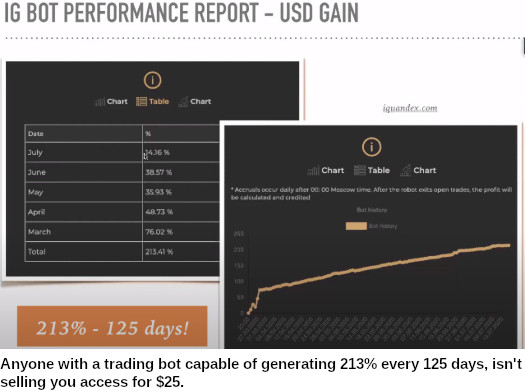
A link to iQuandex’s official YouTube channel is provided, featuring marketing videos in Russian.
iQuandex’s website domain (“iquandex.com”) was registered on March 18th, 2020.
Abrarov Rinat Fanozovich is listed as the owner, through an address in Tatarstan, Russia.
If you punch “Abrarov Rinat Fanozovich” into Google, there are literally no results. Thus whether Fanozovich is an actual person remains unclear.
iQuandex’s marketing material features Denis Derkach, who is apparently an “international cryptoexpert”.
Derkach’s Facebook profile states he’s from Russia but lives in California.
Derkach’s Facebook feed is full of offers like this;
Start making nothing less than $15k $350k BTC weekly trading Bitcoin under my supervision.
Derkach’s Facebook account was only created on August 16th, 2020, which is pretty suspect.
On his active VKontakte profile, Derkach cites his current city as Moscow, Russia. Why he’s pretending to live in California on Facebook is unclear.

Going back further to 2016, Derkach was promoting Vizionary, another MLM crypto Ponzi scheme.
At the time of publication Alexa ranks Kazakhstan as the only notable source of traffic to iQuandex’s website (60%).
As always, if an MLM company is not openly upfront about who is running or owns it, think long and hard about joining and/or handing over any money.
iQuandex’s Products
iQuandex has no retailable products or services, with affiliates only able to market iQuandex affiliate membership itself.
iQuandex’s Compensation Plan
iQuandex affiliates pay a fee, which determines how much money they can place under the control of iQuandex’s “iQ Bot”.
Funds are placed under the control of iQ Bot on the promise of advertised returns:
- pay $25 to be able to invest $250 to $1500 on the promise of a 110% ROI
- pay $250 to be able to invest $250 to $1500 on the promise of a 150% ROI
- pay $750 to be able to invest $200 to $5500 on the promise of a 150% ROI
- pay $1500 to be able to invest $7500 to $15,000 on the promise of a 150% ROI
- pay $5000 to be able to invest $20,000 to $60,000 on the promise of a 160% ROI
Note that the first option is only available to new iQuandex affiliates and can only be used once.
There doesn’t appear to be a fixed term for iQuandex investment.
Once the advertised return has been paid, an iQuandex affiliate must once again pay the full membership fee to reinvest.
iQuandex’s Affiliate Ranks
There are ten affiliate ranks within iQuandex’s compensation plan.
Along with their respective qualification criteria, they are as follows:
- Bronze – generate $1000 in downline investment volume
- Silver – generate $3000 in downline investment volume
- Gold – generate $10,000 in downline investment volume
- 1 Star – generate $30,000 in downline investment volume
- 2 Stars – generate $80,000 in downline investment volume
- 3 Stars – generate $240,000 in downline investment volume
- Diamond – generate $720,000 in downline investment volume
- Red Diamond – generate $2,180,000 in downline investment volume
- Blue Diamond – generate $6,500,000 in downline investment volume
- Grand Blue Diamond – generate $20,000,000 in downline investment volume
Recruitment Commissions
iQuandex pays commissions on the recruitment of new affiliates.
Recruitment commission rates are based on how much the recruiting affiliate has paid in membership fees.
- pay $25 or $250 in membership fees and receive 8% on recruited affiliates
- pay $750 or $1500 in membership fees and receive 10% on recruited affiliates
- pay $5000 in membership fees and receive 12% on recruited affiliates
A $100 recruitment bonus is paid if a new iQuandex affiliate recruits two $250 or higher tier affiliates within their first 72 hours.
This bonus is increased to $150 if three affiliates are recruited.
Residual Binary Commissions
iQuandex pays residual commissions on initial fees paid via a binary compensation structure.
A binary compensation structure places an affiliate at the top of a binary team, split into two sides (left and right):
The first level of the binary team houses two positions. The second level of the binary team is generated by splitting these first two positions into another two positions each (4 positions).
Subsequent levels of the binary team are generated as required, with each new level housing twice as many positions as the previous level.
Positions in the binary team are filled via direct and indirect recruitment of affiliates. Note there is no limit to how deep a binary team can grow.
Sales volume across the binary team based on how much affiliates placed within the team pay in membership fees.
- a $25 fee recruited affiliate generates 10 points
- a $250 fee recruited affiliate generates 100 points
- a $750 fee recruited affiliate generates 300 points
- a $1500 fee recruited affiliate generates 600 points
- a $500 fee recruited affiliate generates 1200 points
Remember binary team affiliates can be directly or indirectly recruited.
At the end of each day iQuandex tallies up new fee volume on both sides of the binary team.
Affiliates are paid $25 per 100 points matched on both sides of the binary team.
Residual Unilevel Commissions
iQuandex pays residual commissions on reinvestment fees via a unilevel compensation structure.
A unilevel compensation structure places an affiliate at the top of a unilevel team, with every personally recruited affiliate placed directly under them (level 1):
If any level 1 affiliates recruit new affiliates, they are placed on level 2 of the original affiliate’s unilevel team.
If any level 2 affiliates recruit new affiliates, they are placed on level 3 and so on and so forth down a theoretical infinite number of levels.
iQuandex caps payable unilevel team levels at ten.
How many levels residual commissions are paid on is determined by how much an iQuandex affiliate has paid in fees:
- pay $25 or $250 and receive 5% on level 1 (personally recruited affiliates)
- pay $750 and receive 5% on levels 1 to 3
- pay $1500 and receive 5% on levels 1 to 5
- pay $5000 and receive 5% on levels 1 to 10
Rank Achievement Bonus
iQuandex reward affiliates for qualifying at Bronze and higher ranks with one-time bonuses:
- qualify at Bronze and receive $50
- qualify at Silver and receive $150
- qualify at Gold and receive $500
- qualify at 1 Star and receive $1000
- qualify at 2 Stars and receive $3000
- qualify at 3 Stars and receive $10,000
- qualify at Diamond and receive $25,000
- qualify at Red Diamond and receive $60,000
- qualify at Blue Diamond and receive $180,000
- qualify at Grand Blue Diamond and receive $500,000
Joining iQuandex
iQuandex affiliate membership ranges from $25 to $5000.
Once the advertised return rate is paid out, an affiliate must pay another membership fee to continue earning.
The more an iQuandex affiliate pays in fees, the higher their income potential.
Conclusion
iQuandex is a pyramid scheme attached to a trading bot.
We are a team that has created a reliable tool for automatic cryptocurrency trading: Bitcoin, Ethereum, Ripple, Tether, USDT.
New iQuandex affiliates sign up, paying those who recruited them. These new affiliates are then paid to recruit new affiliates, with nothing marketing or sold to retail customers.
Pay to play is also evident, by way of higher fees paid resulting in higher income potential.
Pay to play is a hallmark of an MLM pyramid scheme.
Pyramid schemes are illegal, so I just want to point out that irrespective of anything else, iQuandex’s business model is fraudulent to begin with.
iQuandex markets passive returns through their iQ Bot. This is a securities offering and, regardless of whether iQuandex is run by persons unknown, needs to be registered with financial regulators.
iQuandex provides no evidence it has registered its passive investment opportunity, meaning in addition to being a pyramid scheme, the company also commits securities fraud.
The way these “you’re always in control of your money” trading bot schemes work is full access is signed over to persons unknown.
Across however many accounts the bot owners have access to, they can coordinate trades in the admin’s favor.
This doesn’t happen noticeably though until it’s time to exit-scam.
In the meantime money is shuffled between accounts the bot has access to create the illusion of trading profits (internal trading).
When the time comes to exit-scam (when pyramid recruitment slows down), the bots execute lop-sided trades with accounts under iQuandex’s control.
The majority of participants take a loss and the admins disappear.
In conclusion the “you’re always in control of your money” pitch is a con.
If iQuandex’s owners actually had a bot capable of generating consistent 50% returns, they’d be quietly running it for themselves.
Update 21st January 2021 – iQuandex has collapsed.
As predicted, Denis Derkach executed rigged trades across the platform about a week ago. Affiliate investor funds were promptly stolen.





